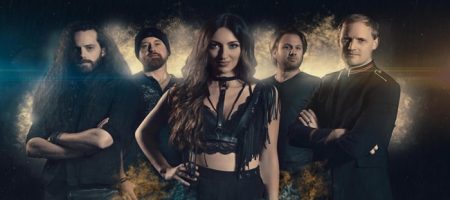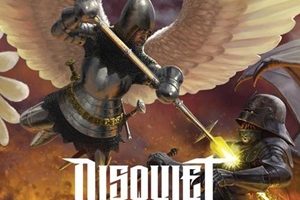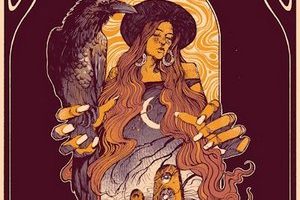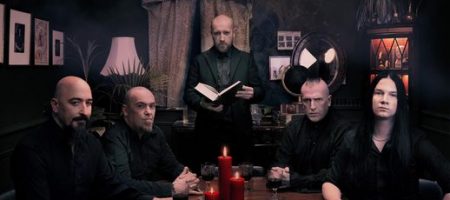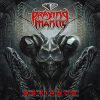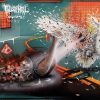Delain – Hungry for Success
Sunday, 14th August 2016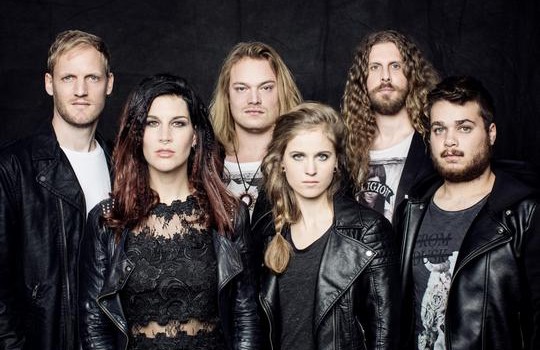
Starting as a project only to develop into a full-fledged band, chances are if you follow the gothic rock or symphonic metal scenes, the Dutch sextet Delain has crossed your headspace or aural activities more than once. Incorporating a host of outside electronic, modern, and pop influences to the mix has allowed Delain to develop a healthy following from metal audiences far and wide – each album gaining more traction while the touring schedule and opportunities increase in their favor.
Keyboardist Martijn Westerholt has been given a second chance to succeed in this ever-evolving metal marketplace – as health issues caused him to leave Within Temptation, a band started by his brother guitarist Robert Westerholt in 2001 just before they would start to breakthrough on the Mother Earth album and touring cycle. Never taking anything for granted, Delain is now poised to cement themselves into permanent headliner status because of their consistent, high quality studio releases plus rapturous live performances opening for the likes of Kamelot, Sonata Arctica, and Nightwish in North America alone over the last few years.
Moonbathers is the fifth studio full-length from the band – encompassing shades of heavier terrain while also being very beautiful in others. Confidence has a way of showing true colors, and to these ears Delain has put their best creative ideas forward at the right time. All the more reason to set up a Skype interview with Martijn, who has a soft-spoken and kind nature to handling these questions. We cover a lot of ground surrounding his initial impetus behind Delain, the faithfulness of their fanbase, and thoughts regarding other bands in the genre – a great half-hour chat that should have you seeking out more of their discography, as the show goes on…
Dead Rhetoric: You had to step away from Within Temptation in 2001 due to Pfeiffer’s Syndrome, only to see them breakthrough. Did that push you harder in the early days of Delain to set the stage for this band’s breakthrough a decade in – and what measures did you have to take to get on the road to recovery?
Martijn Westerholt: It was not a driving force for me or a motivating factor. What I wanted to do with Delain when I made the first album, I just wanted to prove to myself that I am capable of making an album on my own. That was actually it. I wasn’t planning to become a professional musician, I wasn’t planning to be here right now, where we stand. It just developed and happened like that. I consider myself really lucky and spoiled with that. I’m really grateful for that.
It took me 10 years to fully recover. At first I couldn’t function at all- I was happy that I was out of Within Temptation because the whole circus started and I really couldn’t physically do that (touring). And of course it was hard seeing them on television getting awards and me not being there- on the other hand, this was my brother and Sharon’s party and not my party. I needed to rest, I slowly started writing on my own just for the fun of it. Then it went out of control slowly but steadily. It was not really planned, but I learned a lot. As a result, Lucidity came to be. Then the record label asked me if I would take this project and turn it into a band so they could support it better. I thought that was a lot of fun- and that’s how Delain started. And Charlotte was already involved, because when you make a project, I wanted to give Delain its own identity and not fully support this purely on guest musicians. I realized in the beginning this was a very good ground on building up Delain as it is right now. That’s how it all happened. Right now I feel that I am at 95% physically, sometimes when I get the flu I get my old symptoms back as well. I can fully function again, and I appreciate things much more. I appreciate life very much, you learn a lot from being sick that long of a time, and not knowing what it is. It was really hard.
Dead Rhetoric: Moonbathers is an unusual title for a record – how would you describe this set of songs and recording sessions in comparison to the other records? It feels to me like there’s a sense of confidence in where you want to go, and at times pushing things a little heavier/darker than before for the group…especially gaining a guest vocal from Arch Enemy’s Alissa White-Gluz on “Hands of Gold”?
Westerholt: Yes, we are very confident. The writing team consists of Charlotte, Guus (Eikens), and myself. Gus may not be a part of the live band but he’s always been a part of the writing team. There were no worries whatsoever. We’ve made a lot of albums together, so we know the drill. We like the experiments, and push things further. This time we choose to chop the whole process up in pieces- partially because we had a lot of live activities going on, that makes you far more flexible. The whole production itself becomes more flexible, you are in a better position to tweak on things that you did earlier, take a look at things with a very fresh perspective that I think is very healthy. For the next album I would like to take things to even more of an extreme and do things song by song. Write a song, record it, mix it- and then write another song, record it, mix it- you see this approach in other genres like dance as well.
The whole album should be a collection, it has to be cohesive. This was a very nice thing to discover. Our bandmates we always try to involve them, and that’s very hard for Delain because it’s like a train that’s rolling, and if you hop on that’s great, but if not, the train will keep on rolling. I noticed that Timo (Somers) our guitar player told me a couple of weeks back that this is the first Delain album he is really proud of because he was able to put his mark and stamp on it. He did a lot of guitar arranging on this, and you can hear the influences on his riffing, it makes things a bit heavier. I very much like that. With Merel (Bechtold), our new guitarist, she was tying things together from her previous activities so she wasn’t ready yet to get as involved, but she will be with the next record.
Dead Rhetoric: Taking on a Queen cover for “Scandal” can be a bold proposition for any artist, how did you come about choosing this song from The Miracle record for the new Delain album – did you feel scared or exhilarated to tackle a track from this legendary rock band?
Westerholt: First of all, I have always said that covering Queen is committing suicide. Don’t touch it! This particular song, I started listening to Queen when I was a teenager in the beginning of the 90’s and this track stood out to me. And then I lost track of it, and I rediscovered it. This song really has a Delain vibe to it, it’s very compatible. I’m really curious how this would sound with the Delain sound. I dared to touch it because it’s one of the lesser known songs. If we had a male singer, I never would have touched this song, but because we have Charlotte, it’s a different story. Freddie Mercury is not of this world, so you can’t get that standard- but a female singer is different.
We have a British manager, and she contacted Queen’s management. She got ahold of Brian May, and we e-mailed them both at the same time. The management wanted to listen to our version, which was good, but on the other hand we still had to make it. If you make it and put a lot of time, effort, energy, and money into it- and we didn’t have a lot of time because we are so busy- you don’t want to hear ‘yeah, thank you- but we don’t like it- bye!’ (laughs). But what happened is Brian May personally e-mailed us, he checked out the band and really liked the band. He gave us his permission upfront already, so that was a big honor. The only thing managers and publishers can do then is follow if the songwriter gives his blessing. So that’s what we did, so we tried to have respect for the song and keep all the elements in, but give our own identity to it.
Dead Rhetoric: As a sextet now, do you face any special challenges in getting the right balance around the globe when performing live? And do you have a preference in terms of clubs versus theaters or festival stages when playing out – or are all equally exciting and intoxicating to you?
Westerholt: They are all different. It’s more challenging to do a festival for example, because those people didn’t buy a ticket for you, they bought a ticket for the festival. It’s partially for you, but not all of them – so you have to convince them, which I find exciting. There is a relative comfort in playing a headlining club show- its far more intimate and you can make this magical vibe together, which is fantastic. It’s just different- I love it all, but only to a certain extent. I don’t want to do club shows the whole year, or festivals the whole year- so a mixture of them is just perfect.
I’m really happy with our sound engineer, and I really like our sound on stage a lot. We rarely get complaints about the sound, if we do it’s because the people are standing in a corner. Or when there are technical problems with the P.A. In general, we are very happy – and right now we have the strongest live team ever with our live band right now. It’s not only counting your blessings, you always try to push it. When we rented a venue a few weeks ago, we did it without a crowd, only to play and see what sounds good, what doesn’t sound good- always tweaking things and challenging ourselves. I’m really happy with the balance that we have.
Dead Rhetoric: Considering the numerous tours you’ve been a part of over the last few years, are there any special takeaways you’ve learned from bands like Nightwish, Sabaton, Sonata Arctica, and Kamelot for instance that you’ve applied to make Delain stronger in that aspect?
Westerholt: Well, that’s a good one. No, because I don’t think you should mimic or steal other bands’ aspects. You can look at other bands and for example see what a front person does to communicate to the crowd and take that with you. But you have to do that in your own way because you have to be you. I always regard a crowd as a single entity, and you talk to a crowd the same way as you are talking to a single person. Don’t talk in a different way because it’s just strange. If you make things small, it will work. You learn the most from play, play, play- and see what works the best. For example, it’s good to film your own show and see what works and what doesn’t. I love to play the United States, it’s my favorite country to tour because the people are very open and tell you what they think, I appreciate that very much. The venues are cramped sometimes because there isn’t a lot of government funding, you have to make it on your own as a venue. If you know this and work around this, it can be rewarding.
Dead Rhetoric: What are your thoughts on the symphonic metal and gothic rock genres that Delain is a part of – how do you differentiate yourselves from trend setters such as Nightwish, Within Temptation, and Epica for instance?
Westerholt: Well, I think… highlight your own personality, and Charlotte has a very characteristic voice, which is part of it. We write in a very pop structure way, our songs, and that’s kind of what Within Temptation does too- but our music is more metal than Within Temptation. I also love orchestration, which you can find within Nightwish as well- but Nightwish doesn’t have a lot of electronic elements which we have. It’s about developing your own identity- also when you look at the artwork for example, it’s very recognizable, our sound is very recognizable, it’s something we struggled with for a very long time but now we are reaching a point where people can really recognize us and know ‘oh- that’s Delain!’. Because of our production, because of our singer, because of our artwork, because of how we make songs. I’m not really busy with how other bands do it- I think that can only work the wrong way. Regarding Epica, I never really understood the comparison to them because their music is so different- it’s totally not my taste. They write their songs not in a pop structure but more of a classical approach. There are female vocals and keys in there – on a personal level though I like those people very much. Coen (Janssen) the keyboard player we’ve toured with, and I have talked a lot with Mark (Jensen), but when it comes to the music, it doesn’t appeal to me.
Pages: 1 2











